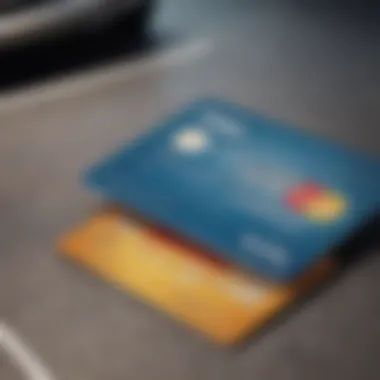Payment Methods for Car Insurance: Using Credit Cards


Intro
Dealing with car insurance payments can feel like a labyrinth of choices, especially when it comes to financing methods. Many folks start wondering, Can I use my credit card for this? This inquiry often leads down a rabbit hole of benefits and potential pitfalls. Credit cards can be like double-edged swords—they might offer convenience, yet they also come with implications that can affect everything from your monthly budget to your credit score.
In this discussion, we dive headlong into the nuances of using credit cards for car insurance payments. We will cover essential concepts of financial literacy, budgeting strategies, and the impact of credit on personal finance. By the end, you’ll have a clearer picture of whether tapping your card for insurance payments is a savvy move or a misstep.
Understanding Financial Literacy
Definition and Importance
Understanding financial literacy is akin to having a roadmap in a crowded city. It’s not just about knowing how to balance a checkbook; it’s about grasping how money works in a broader sense. Financial literacy encompasses various skills, including budgeting, saving, investing, and understanding credit. With this knowledge, individuals, regardless of age, can navigate financial decisions with confidence.
Basics of Financial Literacy
For young professionals and students, some key elements of financial literacy include:
- Budgeting: Knowing how to allocate funds effectively to meet expenses without overspending.
- Saving and Investing: Understanding the importance and methods of accumulating wealth over time.
- Credit Management: Learning about credit scores, interest rates, and the responsible use of credit cards.
Being financially literate enables you to make informed choices, helps in avoiding unnecessary debt, and allows for better management of resources.
Importance of Budgeting
Overview of Budgeting
When it comes to personal finance, budgeting often plays a pivotal role. It’s the practice of estimating income and expenses over a certain timeframe. A well-crafted budget can prevent you from living paycheck to paycheck and help identify areas where savings can be piled up.
Benefits of Having a Budget
There are numerous advantages to having a budget, which can include:
- Clarity: It provides a clear understanding of where your money goes each month.
- Control: Helps to eliminate unnecessary spending and prioritize essential expenditures.
- Goals: Aids in reaching financial goals, whether saving for a vacation or preparing for retirement.
The budgeting process can also serve as a reality check. It highlights what’s truly necessary versus what’s just nice to have.
In sum, being financially literate and savvy about budgeting can enhance your money management skills. This becomes particularly significant when considering payment methods for major expenses like car insurance — allowing you to weigh the pros and the cons of opting to use a credit card for such payments, thereby making an informed choice.
Understanding Car Insurance Payments
Understanding how car insurance payments operate is essential for anyone looking to effectively manage their financial obligations related to vehicle ownership. Car insurance is not merely a safeguard against accidents; it is often a legal requirement, so steering through payment options can have significant implications for your finances and peace of mind.
One key aspect of car insurance payments is recognizing their recurring nature. Unlike a one-time purchase, premiums must be paid regularly, whether monthly, quarterly, or annually. This ongoing commitment can impact cash flow and budgeting. Paying attention to how and when these payments are made could mean the difference between running into financial trouble or staying ahead of the curve.
Benefits come in various forms when considering how to pay for your car insurance:
- Flexibility in payment options encourages exploration of strategies that can optimize cash flow.
- Understanding different options can help in picking a method that aligns with your financial behavior and payment habits.
- Knowing the payment timeline helps in avoiding lapses in coverage, which could jeopardize your legal standing and financial safety.


While many people might think of checks or bank transfers as payment methods, credit cards often find their way into discussions about car insurance payments. This article aims to dissect this concept, as there could be various reasons to consider using a credit card—from earning rewards points to building credit. However, awareness of potential drawbacks is crucial to making the right choice.
"An informed decision can save more than just money; it can protect your entire financial landscape."
As the world grows increasingly digital, the avenues for making payments can evolve, presenting benefits and challenges alike. Familiarity with your payment options ensures that you can maneuver through this landscape effectively. With so much at stake, it's only sensible to dive deeper into the basics of car insurance, establishing a solid groundwork for understanding the payment methods available to you.
Credit Card Payments for Insurance
When it comes to managing car insurance, the payment method you choose can greatly influence your financial landscape. Credit card payments for insurance are gaining traction among various demographics, particularly young professionals and small business owners. This section delves into the nuances of using credit cards for car insurance payments, detailing the potential advantages and key considerations that could impact decision-making.
Using a credit card for car insurance isn't just about convenience; it's also about the financial benefits that can be derived from it. Many credit cards offer rewards like cash back, points, or travel miles that could translate into real savings or perks. However, beyond surfacing rewards, the practicality of credit card payments makes them a popular choice in today's financial realm. That said, individuals should weigh the pros and cons carefully to make informed choices aligned with their financial strategies.
Is Credit Card Payment Possible?
The feasibility of using a credit card for car insurance payments primarily hinges on the policies of individual insurance providers. Not every company allows this method of payment, so it’s wise to check with your insurer first. Most significant players in the market do have the option available, creating an avenue for clients to settle bills with a swipe of their plastic.
Research indicates a growing number of car insurance companies are moving towards more flexible payment options, including credit cards. In various cases, paying by credit card can be a straightforward process: you simply log into your insurance account, select credit card as the payment method, and provide the necessary details. Remember, this is often possible through online portals, which streamline the transaction process rapidly. However, keep an eye on your insurer’s terms and conditions.
Insurance Companies That Accept Credit Cards
Not all insurance companies are on the same page regarding credit card acceptance. Some providers that allow credit card payments include:
- Geico
- State Farm
- Progressive
- Allstate
- Nationwide
Using a credit card can be especially advantageous with companies that have integrated smoother online systems, allowing for quick access to your account and prompt payment. However, it’s crucial to verify not only if the company accepts credit cards but also the terms surrounding those payments – including any additional fees.
"Understanding the payment methods of your insurance company is essential to avoid unnecessary charges and manage your finances effectively."
Before settling on this payment route, it’s also prudent to factor in how these payments could affect your overall financial strategy. For instance, if you're earning rewards, you might find the value of those outweighs any fees. On the flip side, be cautious about hitting credit limits or incurring high-interest debt if you're unable to pay off your balance promptly.
Ultimately, knowing your options clearly will empower you to make sound financial decisions when it comes to paying for car insurance.
Benefits of Using a Credit Card
When it comes to managing car insurance payments, using a credit card can offer a variety of advantages, not just for convenience but also for potential financial benefits. Understanding these advantages is crucial for young professionals and small business owners aiming to optimize their cash flow and take control of their finances. Here, we explore several key benefits of using credit cards for car insurance payments, providing a comprehensive view of why this option may suit your needs.
Rewards and Cash Back Opportunities
One of the most appealing aspects of using a credit card to pay for car insurance is the possibility of earning rewards or cash back. Many credit cards offer incentives that can accumulate based on your spending habits. This could mean receiving a percentage back on every insurance payment you make. For instance, if you have a card that offers 2% cash back on all purchases, and your car insurance premium is $1,200 annually, you'll get $24 back just for using your credit card. This small amount can add up when you consider multiple payments throughout the year.
However, it's essential to keep in mind that not all credit cards provide the same rewards structure. Therefore, always read the fine print to see what applies. Some cards even cater specifically to auto-related expenses, offering increased rewards when you use them for car payments. By choosing the right credit card, you can turn what would inherently be a tedious expense into a rewarding experience.
Convenience and Ease of Payment
Another significant advantage of utilizing a credit card is the convenience it brings. Paying your car insurance via credit card can often be done quickly online or through a mobile app, saving you time and effort. In our fast-paced world, who has hours to spend writing checks or standing in line at the bank? With just a few clicks, your payment can be processed, freeing you up to focus on other important tasks.
Moreover, many credit card companies also provide reminders for when payments are due. If you setup automatic payments, you can ensure you never miss a due date, which can help you avoid any late fees or potential lapses in coverage. With the added security of digital payments, you can rest easy knowing your transaction is not only timely but also protected.


Documentation and Record-Keeping
Lastly, credit cards provide a built-in advantage for those who prioritize organization in their financial management. When you pay your car insurance with a credit card, you have a detailed record of all transactions readily available. Each payment is tracked in your monthly statements, simplifying the process when tax season comes around or when you need to assess your financial health.
"Good record-keeping isn't just about tracking expenses; it's also about ensuring you have accurate data readily available when you need it most."
With digital statements and easily accessible online accounts, you can quickly gather necessary documentation if you need to dispute a charge or provide proof of payment. This level of organization not only promotes better budgeting practices but also enhances overall financial literacy.
In summary, the benefits of using a credit card for car insurance payments span beyond mere convenience. They encompass potentially lucrative rewards, effortless payment processes, and improved record-keeping that can simplify financial management. As you consider your options, weighing these factors against your personal financial situation is key to making an informed decision.
Drawbacks of Credit Card Payments
While using a credit card for car insurance payments may seem like a convenient option, it’s important to consider the pitfalls that come with it. Understanding these drawbacks helps individuals make better, more informed decisions about their finances. Analyzing potential fees, credit utilization, and the risk of overspending are all essential components of this discussion.
Potential Fees and Charges
When opting to pay for car insurance with a credit card, one must be aware of the fees that might accompany this method. Some insurance providers might charge a processing fee for credit card transactions, which could range from a small percentage to a flat fee. This cost can quickly pile up, overshadowing the benefits of using a credit card. It’s akin to trying to save and only finding out later that unforeseen expenses swallow up your gains.
In certain cases, credit card companies may also have their transaction fees, especially if you are using a rewards card. Being mindful of these charges is crucial.
"The devil is in the details; always read the fine print before making financial commitments."
Moreover, if you miss a payment and incur late fees, the situation worsens. So, if you decide to rely on your credit card for insurance, it’s critical to keep tight reins on your due dates.
Impact on Credit Utilization
Using a credit card for car insurance payments can also influence your credit utilization ratio, which is the amount of credit you are using compared to your total available credit. Ideally, you want to maintain this ratio below 30%. However, if your insurance premium is substantial and you’re putting it all on one card, your utilization might spike.
This uptick in usage can signal to lenders that you might be financially overextended. Since lenders look at this ratio to gauge creditworthiness, consistently high utilization could impact your credit score negatively. It’s worth remembering that a good credit score opens doors to more favorable loan terms, so safeguarding it should be a priority.
Risk of Overextending Finances
Lastly, the ease of using a credit card can lead to overspending, particularly for those who might not be as disciplined with their finances. Car insurance is often a significant recurring expense. Paying it with a credit card could create a false sense of financial security, leading individuals to neglect the impact on their overall budget. If someone pays for their insurance on credit and then continues to run up charges elsewhere, they risk landing themselves in a financial bind.
Setting up credit card payments can create a slippery slope if not monitored closely. It’s important for individuals to ask themselves if they’re financially prepared to handle credit card bills, especially when unexpected costs may arise from car repairs or other expenses unrelated to insurance. In essence, while credit cards offer convenience and rewards, they can also encourage habits that lead to financial strain if one isn’t careful.
Navigating the Payment Process
When it comes to handling car insurance payments, exploring the process is vital. Knowing how to navigate this maze can save a lot of frustration. Understanding payment methods not only helps ensure timely payments but can also have a significant impact on your overall budget. Balancing the intricacies of payments with the variety of available options requires some finesse, making this section particularly essential. By familiarizing yourself with the ins and outs, you'll feel more confident choosing the right route for your financial situation.
Steps to Pay Insurance with a Credit Card
Paying for car insurance with a credit card can take the edge off, provided you understand the procedure. Here’s a straightforward approach to get started:
- Check with your Insurance Provider: Before anything else, confirm if your insurance company accepts credit card payments. This can usually be found on their website or by contacting their customer service.
- Gather Necessary Information: Have your policy number, card details, and any other required information at hand. This makes the process smoother and helps avoid any hiccups during the transaction.
- Log into your Account: Most insurance companies will have an online portal. Log in, and navigate to the payment section. Look for an option regarding credit card payments.
- Enter Payment Details: Input your credit card number, expiration date, and security code. Double-check these details to avert mistakes—typos can lead to declines.
- Review and Confirm: After entering everything, review your payment details. Make sure numbers are correct. Once everything checks out, confirm the payment.
- Keep Record: After payment, save the confirmation number or receipt. This record is crucial in case future discrepancies arise. If needed, you can reference this later.
Setting Up Automatic Payments


Setting up automatic payments can make life a lot easier. Think about it: no more worrying whether you've made the payment on time. To set up automatic payments, follow these steps:
- Access Your Account Online: Just like manual payments, you’ll need to log into your insurance provider’s portal.
- Find Automatic Payment Options: There should be a section for billing preferences or payment options. Look for an option that allows automatic payments to be set.
- Enter Credit Card Details: You must provide your credit card information if you haven't done so already. Ensure this is done securely as personal data is involved.
- Choose Payment Frequency: Decide how often the payment should be deducted. Options often include monthly, quarterly, or annually.
- Confirm Changes: After setting everything, confirm that the automatic payments are set correctly. Check back occasionally to confirm deductions are happening as they should.
Setting up automatic payment can safeguard against lapses in coverage due to missed payments. It's a simple yet effective way to stay on top of your car insurance.
Alternatives to Credit Card Payments
When discussing payment options for car insurance, it's crucial to consider avenues other than credit cards. While plastic can offer convenience, there are valid reasons to explore alternative payment methods. Each method carries its distinct advantages and provides pathways that can suit varying financial situations. Examining options like debit cards, bank transfers, and online payment portals helps individuals streamline their finances while potentially evading some of the disadvantages that come with credit card use.
Debit Card and Bank Transfers
Using a debit card or opting for bank transfers can be a smart choice when dealing with insurance payments. With a debit card, you spend money directly from your checking account, ideally avoiding the pitfalls of accumulating debt. This fosters a more straightforward budgeting process—you're essentially limited to the funds available, which could help in maintaining responsible financial habits.
Moreover, bank transfers often provide an additional layer of security. Many banks offer encryption and fraud protections that can protect sensitive information during the transaction process. They can streamline the payment, ensuring funds are transferred on time and preventing late fees or lapses in coverage.
A few key considerations regarding debit cards and bank transfers are:
- No Interest Fees: Unlike credit cards, there's no risk of incurring high interest.
- More Control Over Spending: This can help keep spending in check, making it easier for budget-conscious individuals.
- Immediate Payment Confirmation: Transfers are often processed quickly, confirming that the bill has been paid without delay.
However, using a debit card might limit rewards or cash-back opportunities that come with credit cards, so this should be weighed against the benefits.
Paying Through Insurance Company Portals
Many insurance providers have developed user-friendly online portals allowing customers to manage their accounts and make payments conveniently. These platforms are not only convenient, but they also offer a suite of features that enhance the ease of managing your insurance, allowing users to monitor their payment history and current coverage.
Opting to pay through these portals can be beneficial for several reasons:
- 24/7 Access: Customers can pay their premiums anytime, anywhere, making it easy to manage insurance without the constraints of traditional office hours.
- Transparency: These portals offer a clear view of one’s policy details, ensuring policyholders know what they’re paying for.
- Automated Remainders: Users can often set up alerts for upcoming payments, which helps mitigate the risk of forgetting to pay on time.
Another advantage is the potential to save time; rather than writing checks or contacting the insurer directly, the online system allows users to complete their transactions with just a few clicks. Furthermore, many insurance companies also encourage portal use by offering discounts for setting up autopay, making this option even more appealing to those looking to cut costs.
Ultimately, while the allure of credit card rewards is significant, weighing other options might just lead to better financial management in the long run. Finding the right payment method is key to ensuring that premium payments fit harmoniously within one's overall budget.
Finale
In evaluating the question of whether one can pay their car insurance using a credit card, it becomes crucial to consider multiple dimensions that shape this decision. The matter is not just about confirming the possibility, but rather understanding its broader implications. For young professionals, students, and small business owners, managing financial options effectively can lead to long-term benefits. This conclusion synthesizes the insights garnered throughout the article, focusing on practical takeaways that matter in everyday financial planning.
Making Informed Financial Choices
Choosing to pay for car insurance with a credit card can be both a strategic and a tactical decision. It essentially allows individuals to leverage the functionalities of credit cards, such as accumulating rewards points or cash back, as well as offering a safety net during financial crunches. In a world bursting with options, making informed choices often means weighing the pros and cons with a discerning eye. Here are some elements to consider:
- Analyzing Fees: Before proceeding, reviewing the payment policies can save a few bucks; no one wants surprise charges, after all.
- Understanding Credit Impact: Credit card utilization can affect your credit score; keeping track of balances ensures you don't exceed wise limits.
- Setting Goals: If rewards or cashback are the priority, aligning these benefits with your payment strategy is a smart move that bears fruit.
Understanding Personal Financial Implications
Using a credit card for car insurance may seem like a fine idea at first, but it requires careful thought regarding your entire financial landscape. A credit card can be a double-edged sword; it has potential benefits but also significant risks if not managed properly. Assessing personal finance ramifications is essential, especially considering:
- Cash Flow Management: Regular payments via credit can cause fluctuations in monthly cash flow, pushing one toward unplanned financial hurdles.
- Long-term Financial Health: Over-reliance on credit and the temptation to ignore debt can lead to a precarious financial situation. Prioritizing a balanced approach is key.
- Risk of Belligerent Debt: While credit cards offer convenience, they also risk spiraling debt, particularly if monthly payment obligations are not met. It’s always wise to maintain a budget that accommodates such expenses.
"An informed consumer is a responsible consumer."
The essence of this conclusion is clear: understanding the interplay between credit spending and personal finance is pivotal. As one navigates the intricate landscape of car insurance payments, the aim remains to ensure that decisions align with both short-term needs and long-term aspirations.



